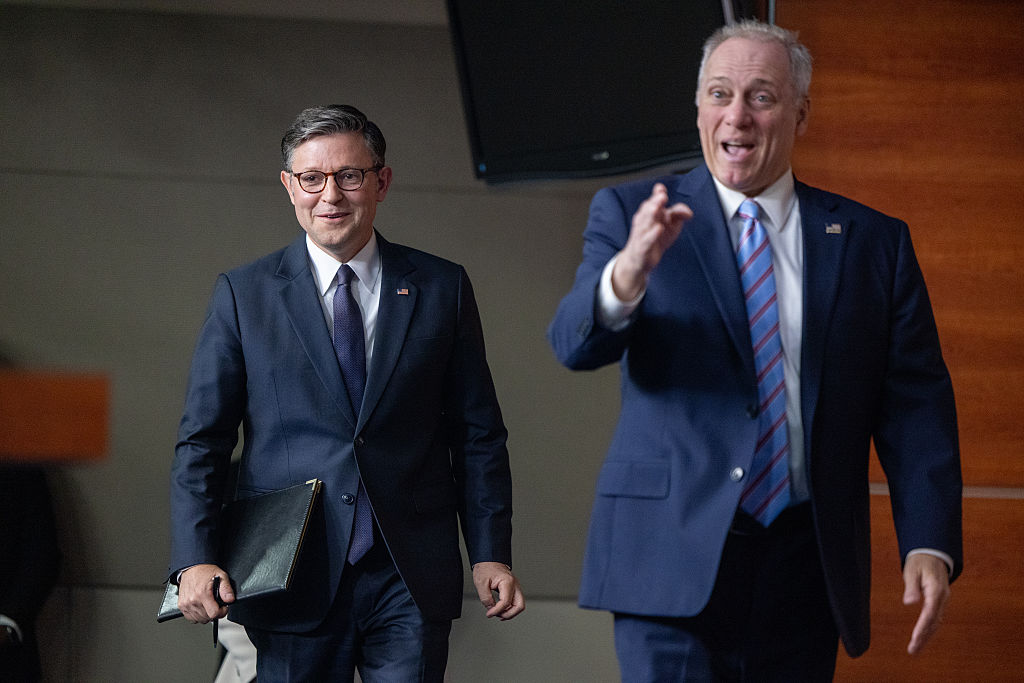Throughout the monthslong process of passing the “One Big, Beautiful Bill” Act in the House, we’ve learned a lot about many of the key figures we track closely. It was an exhausting but illuminating five-month sprint.
We caught up with Speaker Mike Johnson, House Majority Leader Steve Scalise and members of the House Freedom Caucus on Thursday following their vote. We wanted to share insights from these conversations and discuss what it means for governing in Washington.
Speaker Mike Johnson. The speaker deserves a good deal of credit for executing an incredibly difficult task – rallying a GOP conference split sharply along ideological lines around a mammoth tax and spending bill filled with a wide range of priorities.
“I think I anticipated the speed bumps that we would encounter along the way,” Johnson told us Thursday afternoon.
Johnson has tremendous patience, a huge asset in his job. We joke that his tenure should be called the “stay tuned speakership” because he’s always shuttling between different constituencies, trying to resolve conflicts.
Other Republicans told us the speaker takes verbal abuse quite well. This is a marked difference from past speakers. Johnson doesn’t get angry when people get angry at him – which happened quite frequently during the negotiations on this package.
“I can have somebody completely unload on me, and I can look through that and say, ‘You know what? I love that guy. I love that guy. I love her,’” Johnson said.
The Louisiana Republican continued: “I give a lot of grace to people. Because there’s another thing the Bible says: ‘The measure of mercy you give is the measure of mercy you ultimately receive.’”
During the White House meeting Tuesday between Johnson, the GOP leadership team, the House Freedom Caucus and President Donald Trump, tensions were running high – “intense fellowship” as Johnson puts it. Trump left the room with the issues unresolved.
Johnson said OMB Director Russ Vought and Rep. Chip Roy (R-Texas) were able to lower the temperature and get the Freedom Caucus to a good place.
“Especially in these times of great stress and high anxiety, if the leader, if the speaker, throws his hands up and walks out, the whole thing melts down,” Johnson said.
What’s next on reconciliation, for the moment, is out of Johnson’s hands. Senate Republicans are already promising to put their own mark on the bill. Johnson says he has no “pride of authorship.” But the Senate often does.
Johnson wants the Senate to “fine tune this product as little as possible.” He likened his task in the House to “crossing over the Grand Canyon on a piece of dental floss.”
“In times past, Senate and House chambers were pitted against one another, but we don’t have the luxury of that,” Johnson said. “It’s got to be a one team approach.”
Then there’s Trump. The president helped Johnson stay in the speaker’s chair, keep government funded, pass a budget and now clear the reconciliation package. The knock on Johnson from some corners of the conference is that he can’t get anything done without Trump.
Yet every speaker faces a similar dynamic with a president from their own party. With Trump, of course, it’s a daily thing because he makes so much of governing about him and what he wants.
“President Trump is a singular figure,” Johnson told us. “He may be the most powerful president in terms of his stature. It’s earned. … And when you get to know him well, as I do, you understand it. And so he has a tremendous sway.”
President Donald Trump. The reconciliation package wouldn’t have gotten through the House without Trump.
Trump didn’t negotiate the finer details of FMAP, the cost of SALT over the 10-year budget window or get in the weeds on clean-energy policies.
But Trump didn’t throw wrenches into the process either – and that’s different from 2017. For instance, Trump understood, when it was presented to him, that closing the carried-interest loophole didn’t have the votes to pass.
Trump also didn’t allow individual groups of members to go around Johnson or Scalise by using direct appeals to him, although the Freedom Caucus tried. This was a huge problem during Trump’s first term. Trump still talks to anyone who calls, but that doesn’t mean that he undermines GOP congressional leaders. At least not yet.
Most importantly, Trump knew when it was time to stop negotiating. He delivered that message very forcefully to the HFC at the White House Tuesday, eventually leading to the high-stakes Thursday morning vote.
House Majority Leader Steve Scalise. Scalise is now the elder statesman of the House Republican leadership team – and it shows. The 59-year-old Louisiana Republican tries to steer the debate to where he thinks it needs to go for the conference to be successful.
Scalise and Ways and Means Committee Chair Jason Smith (R-Mo.) were very early adopters of the “one-bill strategy.” Scalise convinced Trump of that wisdom, bucking some White House staff.
Scalise was almost always in the room with Johnson as they were working the different factions inside the GOP conference.
“The speaker and I were very disciplined not to promise things just to get a couple of votes,” Scalise told us.
House Freedom Caucus. As always, the Freedom Caucus was on a bit of a rollercoaster ride over the last few weeks. They demanded FMAP changes for Medicaid, and then backed off in the face of heated opposition.They demanded per-capita caps, only to drop that later.
Most of the GOP conference deserves credit for recognizing that the votes simply weren’t there for the policies they were demanding. HFC Chair Andy Harris (R-Md.) voted present, which is a bit of a cop out but did allow the measure to pass.
The Republican Conference is a bit sick of their song and dance, though. Just look at what Rep. Derrick Van Orden (R-Wis.) said after the vote.





